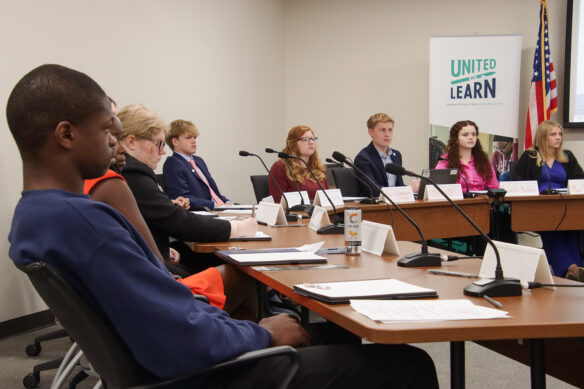
During the first meeting of the 2024-2025 Commissioner’s Student Advisory Council, members listen to presentation about a new education platform intended to help students across the Commonwealth prepare for college and their careers.
Photo by Joe Ragusa, Kentucky Department of Education, Aug. 27, 2024
Members of the Kentucky Department of Education’s Commissioner’s Student Advisory Council met on Aug. 27 to give their feedback on a new education tool and to discuss strategies to address chronic absenteeism.
This was the first council meeting for members serving for the 2024-2025 school year.
Jessica Fletcher, marketing analytics director for the Kentucky Center for Statistics, along with Trinity Walsh, coordinator of early postsecondary opportunities with the Council on Postsecondary Education, presented to council members a platform intended to help students across the Commonwealth prepare for college and their careers.
“This is a website that is built just for students and people who are looking for a new pathway in life. Our goal is to help figure out what students want to do after they graduate from high school,” said Fletcher.
The platform is currently in development, Fletcher said, and is being designed to help Kentuckians visualize their paths from the classroom to their career. It will provide access to resources about financial aid, career paths, career and technical education (CTE) pathways related to careers, and information about Kentucky postsecondary schools to encourage students to create their career roadmap.
The Kentucky Department of Education (KDE) and the Kentucky Council on Postsecondary Education are funding the development of this project with money from the Elementary and Secondary School Emergency Relief (ESSER) fund.
Council members were asked to navigate through the website and share their feedback on how they believed this platform would impact students.
“I think it would be nice to have a college placement quiz, like having something for students who don’t know what type of college would be a good fit for them,” said Sophia Langford, a junior at J. Graham Brown School (Jefferson County).
Walsh said some of the resources are targeted at helping students understand their passions and where they could excel in their skills and knowledge.
“We know that most people don’t wake up in the morning and just decide what career they are going to do. Sometimes it takes soul searching and how all of your strengths play together,” said Walsh. “When you’re looking in some of the sections, we try to give some tools to help you discover yourself and then from there you can understand the major and college process. This website will help guide students through their journey.”
Lisa Abrampah, a senior at Craft Academy (Rowan County), said she appreciated that anyone could use the platform without having to sign in or create an account, making it easy to access.
Commissioner of Education Robbie Fletcher noted that the platform included resources about career and postsecondary options available in Kentucky.
“I would like to encourage all of Kentucky’s students to come home and lead the change within the state,” said Fletcher. “We want our best and brightest to come back home, so we need to educate these students on the opportunities they have here in the state.”
Walsh said the platform may launch in early 2025.
Student feedback on chronic absenteeism
KDE defines a student as chronically absent if they have missed more than 10% of the enrolled time in school. This includes both excused and unexcused absences. Chronic absenteeism affects nearly 30% of students across the Commonwealth each year.
Data presented by Florence Chang, a program consultant in KDE’s Division of Student Success, shows that while school districts have been dealing with chronic absenteeism for years, the problem spiked following the COVID-19 pandemic. In 2018, 5% of districts were considered to have high or extreme levels of chronic absenteeism; in 2023, that percentage was 77%.
Judi Vanderhaar, program consultant in the KDE Division of Student Success, said there are four contributing causes to chronic absenteeism that overlap with each other. Causes include barriers like chronic health conditions, family responsibilities, transportation, housing or food insecurity and community violence. Other contributing causes may be an aversion to school because a student may be struggling academically, emotionally or with their peers or adults in their school. Disengagement with school because the student feels bored or has a lack of warm connection and enrichment opportunities is another cause, along with misconceptions about when to stay home for illnesses and beliefs that only unexcused absences are a problem.
Vanderhaar asked students to provide their feedback on strategies or policy changes they would make to help improve chronic absenteeism within their schools.
“I think the biggest thing is connection-building overall. I think it depends on the district, but creating a district-wide event for students to get together is an incentive and motivation,” said Khoa Ta, a junior at Owensboro High School (Owensboro Independent).
Samarah Higgins, a senior at John Hardin High School (Hardin County), said she knows some students have free periods, study periods or peer mentoring periods and instead of attending those in person, they will sometimes choose to work instead.
“It feels irrelevant when you could be, I don’t know, out making money, and that’s where a lot of schools face the issue of competing with outside opportunities,” said Higgins. “I feel like our generation especially is more focused on the hustle and trying to make money and get ahead on certain things.”
Langford also mentioned the importance of communicating with parents and making sure they understand the impact attendance has on their students and their futures.
“It kind of starts at home, and I feel like connecting with the parents would be a way to prevent absenteeism because if the parent doesn’t care, then the student doesn’t see a reason to care either,” said Langford.
Jennifer Ginn, KDE’s director of communications, discussed the department’s public messaging campaign to raise awareness of the issue. Part of the campaign includes ads on television, radio and billboards across the Commonwealth emphasizing that attendance matters.
“I was shocked when I saw the numbers of students who are chronically absent, and our goal is to let people know what chronic absenteeism is and how prevalent it is across the state,” said Ginn.
The billboard images feature messaging about how much students miss when they aren’t in school, like class, football games, band, gym class, lunch or playing with friends at recess. The TV and radio ads follow a similar theme.
“We are seeing high absenteeism rates with our kindergarten students, and we need parents to be informed on how important it is for their students to be there,” said Ginn.
Peter Jefferson, a senior at Henry Clay High School (Fayette County), recommended placing these public campaign materials inside schools.
“I think it would be worth putting up posters in schools because we tend to notice when things change on billboards and poster boards because you walk past them so many times, so when things are different, we notice,” said Jefferson.
Commissioner Fletcher also said it is important for students to play a part in encouraging their peers to attend school.
“If someone was absent in your class, just let them know you noticed. Let them know you missed them. That makes a difference because they know they were noticed. Students can help us so much by just encouraging other students to stay involved and present,” said Fletcher.
Career and technical education opportunities
Beth Engle, director of the KDE Division of Technical Schools and Continuous Improvement, discussed CTE opportunities available in Kentucky and the benefits of pursuing CTE courses.
“High school graduates that completed a CTE pathway are now employed in Kentucky at a 4% higher rate than all high school graduates,” said Engle.
Engle also noted that high school graduates who complete CTE pathways and are now employed in the state have a 12% higher median wage than all high school graduates.
“CTE programs complement and enhance academic core classes, build professional and employability skills and allow for technical skill attainment,” she said.
Recently added CTE pathways in Kentucky include supply chain management; generative artificial intelligence (AI); and data science/informatics, Engle said.
Honette Irakiza, a senior from South Warren High School (Warren County), said as a student it has been important to make sure students are taking opportunities that align with their future career paths.
“It is hard to balance the AP (Advanced Placement) classes and the CTE courses because (students) want to build their resume with the AP courses,” said Irakiza. “It is important to make your time worth it, while also getting the important things done as well.”
The next council meeting will be held virtually on Oct. 29.




Leave A Comment